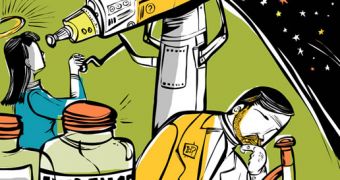There is some ridiculous trying to show that science does cope with religion. But the result is a bogus science. Real science is not based on predetermined facts. And scientists indeed are less religious than the general population, as revealed by a new research, but the cause has little to do with science itself or academic pressures. The result defies the idea that science by itself induces the lack of faith among scientists, showing that family education is the main factor in modeling an individual's religiousness.
"Our study data do not strongly support the idea that scientists simply drop their religious identities upon professional training, due to an inherent conflict between science and faith, or to institutional pressure to conform. It is important to understand this, because we face religious-scientific controversies over stem-cell research and evolution," said co-author Elaine Howard Ecklund, a sociologist at the University at Buffalo.
The research was made on a pool of 1,646 researchers at 21 elite research universities and in-depth interviews were made with 271 of them. These people were specializing in physics, chemistry, biology, sociology, economics, political science, psychology and other domains.
"Nearly 75 % of the subjects responded, which is extremely high for a faculty survey." said Ecklund.
The information gathered showed that growing in a religious home is the most important factor in determining how religious someone will be, no matter if a scientist or member of the general population.
Data for general population was employed from the 1998 and 2004 General Social Survey (GSS), a national approach made by the National Opinion Research Center at the University of Chicago.
The new research revealed that 52 % of researchers that entered the survey pool stated they had no religious affiliation, compared to just 14 % of the overall population. Of the religious researchers, 15 % identified themselves as Jewish, while in the general population just 2 %.
14 % of the general population declared themselves "evangelical" or "fundamentalist", while less than 2 % of researchers regarded themselves as either of these. Paradoxically, younger researchers were more likely to be faithful than older researchers.
"If these young and religious scientists continue to stay religious, it could indicate an overall shift in attitudes toward religion among those in the academy." said Ecklund.

 14 DAY TRIAL //
14 DAY TRIAL //